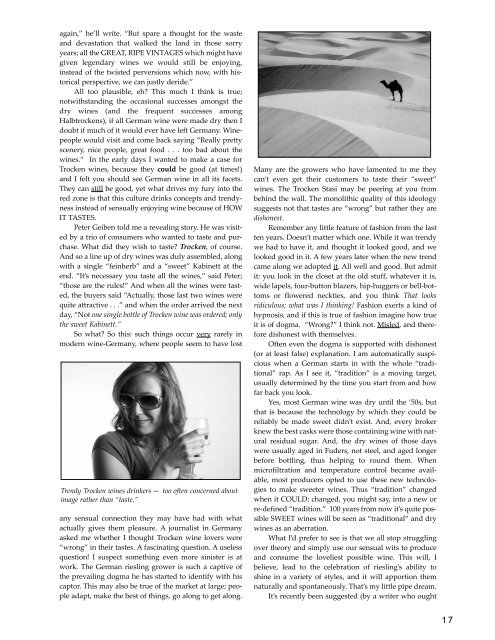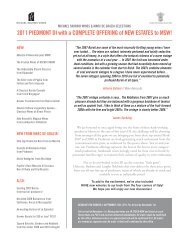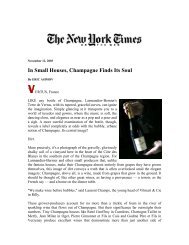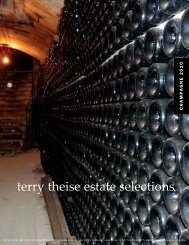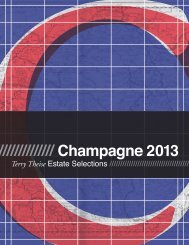German Catalog 2006 USE THIS ONE.qxp - Michael Skurnik Wines
German Catalog 2006 USE THIS ONE.qxp - Michael Skurnik Wines
German Catalog 2006 USE THIS ONE.qxp - Michael Skurnik Wines
You also want an ePaper? Increase the reach of your titles
YUMPU automatically turns print PDFs into web optimized ePapers that Google loves.
again,” he’ll write. “But spare a thought for the waste<br />
and devastation that walked the land in those sorry<br />
years; all the GREAT, RIPE VINTAGES which might have<br />
given legendary wines we would still be enjoying,<br />
instead of the twisted perversions which now, with historical<br />
perspective, we can justly deride.”<br />
All too plausible, eh? This much I think is true;<br />
notwithstanding the occasional successes amongst the<br />
dry wines (and the frequent successes among<br />
Halbtrockens), if all <strong>German</strong> wine were made dry then I<br />
doubt if much of it would ever have left <strong>German</strong>y. Winepeople<br />
would visit and come back saying “Really pretty<br />
scenery, nice people, great food . . . too bad about the<br />
wines.” In the early days I wanted to make a case for<br />
Trocken wines, because they could be good (at times!)<br />
and I felt you should see <strong>German</strong> wine in all its facets.<br />
They can still be good, yet what drives my fury into the<br />
red zone is that this culture drinks concepts and trendyness<br />
instead of sensually enjoying wine because of HOW<br />
IT TASTES.<br />
Peter Geiben told me a revealing story. He was visited<br />
by a trio of consumers who wanted to taste and purchase.<br />
What did they wish to taste? Trocken, of course.<br />
And so a line up of dry wines was duly assembled, along<br />
with a single “feinherb” and a “sweet” Kabinett at the<br />
end. “It’s necessary you taste all the wines,” said Peter;<br />
“those are the rules!” And when all the wines were tasted,<br />
the buyers said “Actually, those last two wines were<br />
quite attractive . . .” and when the order arrived the next<br />
day, “Not one single bottle of Trocken wine was ordered; only<br />
the sweet Kabinett.”<br />
So what? So this: such things occur very rarely in<br />
modern wine-<strong>German</strong>y, where people seem to have lost<br />
Trendy Trocken wines drinkers — too often concerned about<br />
image rather than “taste.”<br />
any sensual connection they may have had with what<br />
actually gives them pleasure. A journalist in <strong>German</strong>y<br />
asked me whether I thought Trocken wine lovers were<br />
“wrong” in their tastes. A fascinating question. A useless<br />
question! I suspect something even more sinister is at<br />
work. The <strong>German</strong> riesling grower is such a captive of<br />
the prevailing dogma he has started to identify with his<br />
captor. This may also be true of the market at large; people<br />
adapt, make the best of things, go along to get along.<br />
Many are the growers who have lamented to me they<br />
can’t even get their customers to taste their “sweet”<br />
wines. The Trocken Stasi may be peering at you from<br />
behind the wall. The monolithic quality of this ideology<br />
suggests not that tastes are “wrong” but rather they are<br />
dishonest.<br />
Remember any little feature of fashion from the last<br />
ten years. Doesn’t matter which one. While it was trendy<br />
we had to have it, and thought it looked good, and we<br />
looked good in it. A few years later when the new trend<br />
came along we adopted it. All well and good. But admit<br />
it: you look in the closet at the old stuff, whatever it is,<br />
wide lapels, four-button blazers, hip-huggers or bell-bottoms<br />
or flowered neckties, and you think That looks<br />
ridiculous; what was I thinking! Fashion exerts a kind of<br />
hypnosis, and if this is true of fashion imagine how true<br />
it is of dogma. “Wrong?” I think not. Misled, and therefore<br />
dishonest with themselves.<br />
Often even the dogma is supported with dishonest<br />
(or at least false) explanation. I am automatically suspicious<br />
when a <strong>German</strong> starts in with the whole “traditional”<br />
rap. As I see it, “tradition” is a moving target,<br />
usually determined by the time you start from and how<br />
far back you look.<br />
Yes, most <strong>German</strong> wine was dry until the ‘50s, but<br />
that is because the technology by which they could be<br />
reliably be made sweet didn’t exist. And, every broker<br />
knew the best casks were those containing wine with natural<br />
residual sugar. And, the dry wines of those days<br />
were usually aged in Fuders, not steel, and aged longer<br />
before bottling, thus helping to round them. When<br />
microfiltration and temperature control became available,<br />
most producers opted to use these new technologies<br />
to make sweeter wines. Thus “tradition” changed<br />
when it COULD; changed, you might say, into a new or<br />
re-defined “tradition.” 100 years from now it’s quite possible<br />
SWEET wines will be seen as “traditional” and dry<br />
wines as an aberration.<br />
What I’d prefer to see is that we all stop struggling<br />
over theory and simply use our sensual wits to produce<br />
and consume the loveliest possible wine. This will, I<br />
believe, lead to the celebration of riesling’s ability to<br />
shine in a variety of styles, and it will apportion them<br />
naturally and spontaneously. That’s my little pipe dream.<br />
It’s recently been suggested (by a writer who ought<br />
17


